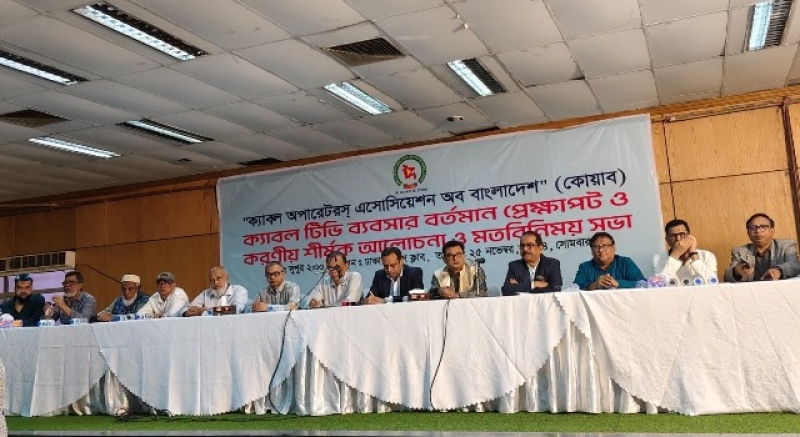- Nation Votes Tomorrow in 13th Poll, Referendum |
- Key in your hands, use it wisely: Prof Yunus tells voters |
- Yunus Urges Voters to Shape a ‘New Bangladesh’ |
- Bangladesh Polls: Campaign Ends as Voters Weigh Pledges |
- Bangladesh Heads to First Gen Z-Driven Competitive Poll |
Cable operators' business in Bangladesh under dark cloud

Cable operators warn of industry collapse within two years without urgent reforms and association support. Photo- Amy Jannat-UNB_11zon
Dhaka, 25 Nov - The future of the cable TV business in Bangladesh remains uncertain, with operators expressing concerns about its survival over the next two years. During a discussion on the current state of the industry, cable operators voiced their frustrations, highlighting the challenges they face in sustaining their business.
"Unless the Cable Operators Association of Bangladesh provides support, we won't be able to continue operating our cable businesses," said one operator. The association's membership has reportedly dwindled to a third of its original size, and operators are questioning when elections will be held within the association and whether they will have the right to vote.
The comments were made during a discussion held at the Dhaka Ladies' Club on November 25, organized by the Cable Operators Association of Bangladesh. The event focused on the current state of the cable TV business and possible ways forward.
Tanjin Rezwan, a cable operator from Dinajpur, expressed deep concern about the industry's stagnation: "The cable business has reached a point where it’s difficult to even talk about it. We have failed to keep up with technology, and now we are facing a crisis."
He urged the association’s leadership to clarify the industry's current situation, questioning whether the operators were merely dormant and why they were not adopting new technologies. He called for a clear statement from the association if they had given up, or a timeline for when they would take action.
Sohel Mahmud, a member of the Sirajganj Cable Operators Association, noted that the introduction of internet services via TV channels has put cable operators at a disadvantage. "We don't have a license to provide internet services, and those who do are making our businesses across the country obsolete," he said.
He appealed for suggestions on how to revitalize the cable business with updated technology.
Abdur Razzak from Tangail also voiced concerns, stressing that the current situation was untenable.
"According to BTRC laws, we cannot use the internet, and we are not receiving adequate support from the Cable Operators Association," he said. "It seems that only through protest and struggle will we secure our rights."
In response to the concerns, the chief adviser of the Cable Operators Association of Bangladesh, S.A. Rahman Parvez, acknowledged the difficulties faced by the industry. "The presence of everyone here today shows that the cable TV business is in trouble," he said. "The issues are so longstanding that it’s become difficult to even look cable operators in the eye."
He expressed disappointment over the association’s annual report, emphasizing that operators should not cause harm to one another.
Parvez proposed that the association's constitution be updated to reflect current industry challenges. He also suggested that any channels that were previously shut down, such as those from OTT, internet, and IPTV services, should be reactivated: "If you want, I will take this issue to the highest levels of government. Cable TV must not be allowed to carry OTT, internet, or IPTV services. We cannot allow dual policies. What is needed now is decisive action."
The event underscored the urgency of addressing the challenges faced by the cable TV industry, as operators called for more robust support and clear strategies to ensure the future of their businesses. - UNB

